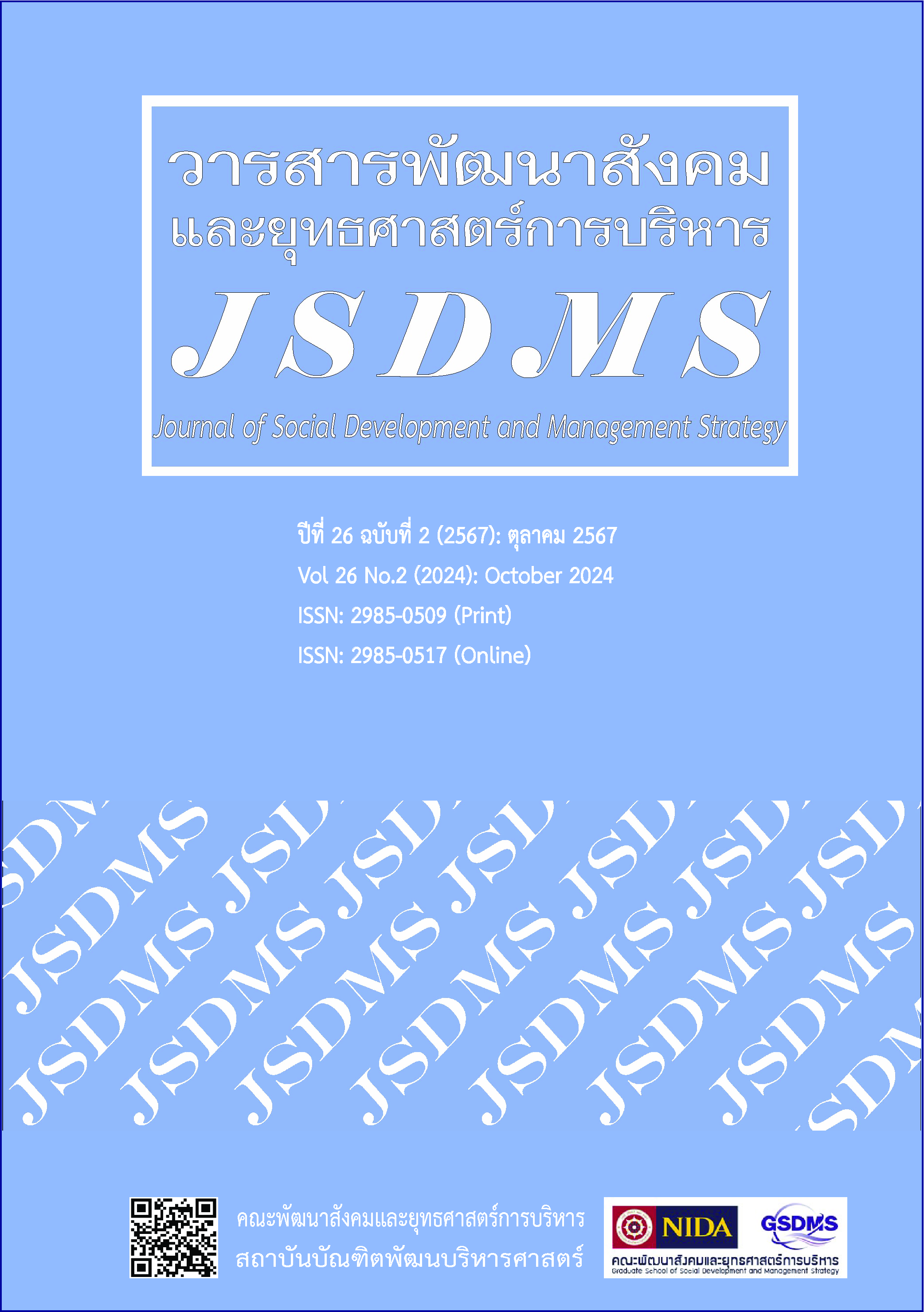Community Enterprise Strengthening: Case study of Indigenous Food Entrepreneurs in Rayong Province
Main Article Content
Abstract
This research aims to study the strength of local food enterprise community businesses in Ban Thale Noi, Rayong Province, using qualitative research techniques. In-depth interviews were conducted with 12 key informants. The findings revealed that the strength of these local food enterprise communities requires further development. The Ban Thale Noi community has promoted the use of Pak Krachab, a local vegetable, as a core ingredient in traditional local dishes, integrating it into the community's lifestyle to enhance community-based tourism. The community has also adapted and utilized local resources to improve production processes in alignment with market conditions, fostering self-reliance. However, several challenges remain for these community enterprises, including: (1) reliance on external markets, and (2) issues in internal management and income distribution within the community enterprise group.
Key recommendations include: (1) To reduce reliance on external markets, the market base should be expanded to link with existing community-based tourism. This can be achieved by introducing additional tourism activities, such as a signature dish experience “Plant, Harvest, Cook, and Taste Local Vegetables and Traditional Cuisine” or the activity “Junior Tour Guides Take the Elderly on a Tour of the Pak Krachab Community.” Increasing the number of tourists can also be supported by encouraging school children, who commute to nearby urban areas for education, to create activities that attract elderly urban communities to visit the Pak Krachab community, and (2) In terms of management and income distribution within the Pak Krachab community enterprise group, it is recommended to ensure continuous, consistent, and fair allocation of responsibilities among members involved in tourism activities, fostering active participation and equitable sharing
Article Details

This work is licensed under a Creative Commons Attribution-NonCommercial-NoDerivatives 4.0 International License.
References
Bevir, M. (2010). Democratic governance. New Jersey: Princeton University Press.
Chhotray, V., & Stoker, G. (2009). Governance theory and practice: A cross-disciplinary approach. New York: Palgrave Macmillan.
Eastern Economic Corridor of Innovation. (2021, 7 August). Why EECi? Retrieved from https://www.eeci.or.th
Kanyamon Inwang et al. (2011). Community enterprise management. Phitsanulok: Phitsanulok University.
Nanthida Jansiri. (2015). Network management in the public policy process. Asrom Walayalak Journal, 15(1), 145-153.
Office of the Secretary-General of the Board of Investment. (2021, May 12). Rayong and Chonburi: Investment value in the Eastern economic corridor increased by 39%. Retrieved from http://www.aseanthai.net/ewt_news.php?nid=11625&filename=index_
Oranicha Huaphin, Ruj Sirisanyalak, Busara Limnirankul, & Pornsiri Sueppongsang. (2021). Self-reliance of community enterprises in food processing in Singburi Province. Journal of Agricultural Production, 3(3), 43-56.
Ostrom, E. (1990). Governing the commons: The evolution of institutions for collective action. Cambridge: Cambridge University Press.
Ostrom, E., Gardner, R., & Walker, J. (1994). Rules, games, & common-pool resources. Michigan: The University of Michigan Press.
Piriyauth Wannapruek. (2019, 23 September). The 'turning point' of Rayong province: Inequality and waste problems. Matichon Online. Retrieved fromhttps://www.matichon.co.th/article/news_1714450
Pleumjai Paijit & Chanwit Thongchoti. (2017). Management processes affecting the effectiveness of community enterprises in food processing and production in Surat Thani Province. Journal of Management Science, 4(2), 175-204.
Prachachat Business Online. (2020, 29September). 10 things that will make you know ‘Rayong,’ the richest and hottest province right now. Retrieved from https://www.prachachat.net/d-life/news-491377
Seree Pongpis & Suphas Chanhong. (2005). Essential information about community enterprises. Bangkok: Thailand Agricultural Cooperative Community Co., Ltd.
Supaporn Prommareng. (2018). Guidelines for upgrading One Tambon One Product (OTOP) food items of the Rim Rong Women's Group, Makuea Jae subdistrict, Mueang district, Lamphun province. Journal of Social Sciences, Srinakharinwirot University, 21(1), 248-258.
Thammanit Sumantakul. (2019, 28July). Management of common-pool resources (CPRs) and Elinor Ostrom's propositions: Use and maintenance under shared rules. Land Bank Management Institute (Public Organization). Retrieved from https://www.labai.or.th
The Designated Areas for Sustainable Tourism Administration (Public Organization). (2018). The community enterprise of Ban Thale Noi Tourism Village, Rayong-hi. Retrieved from https://cbtthailand.dasta.or.th/webapp/community/content/17/
Tourism Authority of Thailand. (2021). The community-based tourism enterprise of Ban Thale Noi, Rayong-hi. Retrieved from https://thai.tourismthailand.org/Attraction/
Wipaporn Ongkonusorn & Chalermrat Prasertsang. (2021). Development of guidelines for community enterprises to meet good food production standards: A case study of the Klong Nang Agricultural Group, Thabo District, Nong Khai province. Journal of Environmental and Community Health, 6(3), 72-80.


